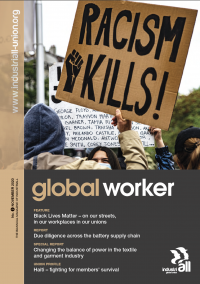19 November, 2020We have lived with Covid-19 since the beginning of this year. Variations of global lockdowns in the first and now second wave have been tough, and workers around the world have been severely affected. The world totals 56 million infected and 1.3 million deaths, bringing us all the challenge of a lifetime
Global Worker No. 2 November 2020 | |
Unions around the world have been fighting like never before to protect the health and safety, jobs and income of their members, while being forced to adapt to the changes brought on by the pandemic. And we have showed that we are prepared to stand up for our members, we are strong and resilient. During the pandemic, we have had the opportunity to learn from each other, find inspiration from each other, support each other and show solidarity.
While the work hasn't stopped, neither have labour rights violations. In some countries they have even worsened as some companies and governments are using the pandemic as a smokescreen to attack democracy, human and labour rights.
Since protests started in Belarus three months ago, the global union movement has been united in its support for democracy in the country. Belarusians have showed an incredible ability to organize, and in the face of repression, workers continue to fight for democracy. International solidarity for the Belarusian unions’ fight for their country must continue.
The profile on GOSTTRA in Haiti tells the story of a young union determined to build workers’ power in the face of adversity.
The special report on the textile and garment industry addresses some of the actions taken to improve the industry and strengthen workers’ rights . And #UnionWins in the face of union busting show that our unions are able to win even in the worst of times.
- The Inditex GFA unlocked a wage conflict in Romania
- IWFM in Myanmar won right to organize through ACT guidelines
- Pregnant garment workers and union activists were reinstated in Bangladesh
The auto industry has also been hit hard, but the hard work of unions on the global framework agreements has been instrumental in protecting workers in the industry.
In Brazil metalworker’s union approved agreement to save jobs at Renault operation.
In Turkey, Lastik-İş reached a strong collective agreement with Goodyear.
Amid the economic downturn caused by the Covid-19 pandemic, the United Workers of Petroleum Industry of Singapore (UWPI) is negotiating with employers to secure local jobs, reskilling trainings and industry transformation.
Battery production will be one of the fastest growing industrial activities in the years to come and workers’ rights need to be safeguarded. Ensuring decent working conditions along the supply chain is key for IndustriALL, as we organize workers in mining, chemicals, energy, electronics and automotive.
Negotiations on a UN binding instrument on business and human rights to end impunity for corporate human rights abuses could be a global benchmark for business and human rights. Employers’ organizations and governments, particularly in rich countries, are trying to undermine the process. We need to maintain the momentum to drive it forward.
A binding treaty on business and human rights is also important in the struggle against systemic racism in the global economy. As the Black Lives Matter movement picked up speed in the middle of the Covid-19 pandemic, the world paid closer attention to the exasperation of people affected by racism.
Like April Sims, secretary treasurer of the Washington State Labor Council, AFL-CIO, says in her interview: "It's not just about bringing another chair to the table, it is making sure that everyone at the table is dealt into the game and knows the rules so that they can compete."
With global solidarity it is possible to win even in the most testing time. And our unions win show the way forward.
A luta continua!
Valter Sanches



